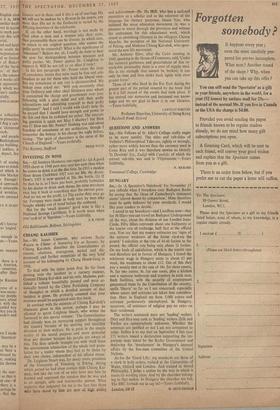CHIANG KAI-SHEK
Sia,—Mr. James Cameron, who reviews Soviet Russia in China: A Summing Up at Seventy, by Chiang Kai-shek, describes the Generalissimo as remote, obstinate, courageous, misled and dis- possessed, and further complains of the very brief account of his kidnapping by Chang Hsueh-liang in
1936. To deal with the latter point first. So far from passing over the incident in a cursory manner, General Chiang Kai-shek and his wife, Madame, pub- lished a volume beautifully printed and most ar- tistically bound by the China Publishing Company of Shanghai in which a detailed account of that incident is given. He probably assumed that your reviewer would be acquainted with that book. In contrast with the estimate of Chiang Kai-shek's character given in this review, perhaps I may be allowed to quote Leighton Stuart, who writes the foreword in this special volume: 'The Generalissimo had already won an increasing support throughout the country because of his untiring and unselfish devotion to their welfare. He is great in the simple reality of his moral purpose and more powerful than any dictator because his people are aware of this. The Sian episode brought out with vivid force the spontaneous admiration of the whole vast popu- lation for a leader whom they feel to be theirs by their own choice, independent of his official status.' Dr. Leighton Stuart was, for many years, president of the University of Yenching in Peking, during which period he had close contact with Chiang Kai- shek, and like the rest of us who have met him he formed and expressed the opinion that he was and is an upright, able and trustworthy person. What supports that judgment for me is the fact that those who have stood by him are men of high ability and achievement—Dr. Hu STA, who has a national reputation as a scholar and as the reformer of the language for literary purposes; James Yen, who initiated the mass education movement (it was a pleasure to travel through the provinces and witness the enthusiasm for this educational work, which aimed at abolishing illiteracy in the villages); Chiang Mon-lin, the president of the National University of Peking; and Madame Chiang Kai-shek, who spon- sored the new life movement.
Mr. Anthony Eden, after the Cairo meeting in 1943, speaking in the House of Commons, said,'Under the outward gentleness and gracefulness of this re- markable personality there is a core of supple steel. His is the strength that cannot he broken; it can only be bent and then strike back again with even greater force.' Those of us who lived in the Far East during the greater part of the period covered by the book find in it a full record of the events that took place. It has revived our memories and increased our know- ledge and we are glad to have it in our libraries. —Yours faithfully, LANCELOT FORSTER Professor Emeritus, University of Hong Kong 7 Bardwell Road, Oxford


























 Previous page
Previous page